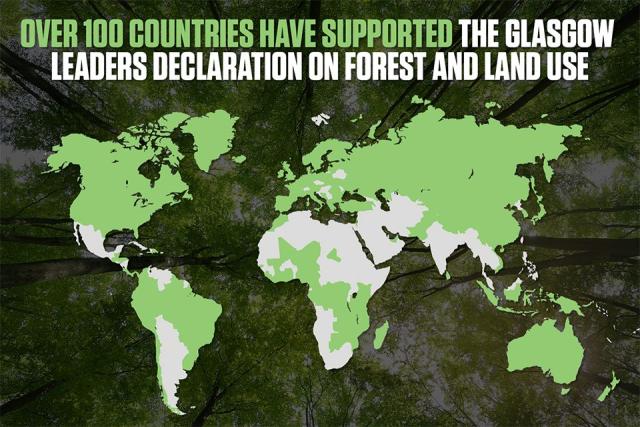At the COP26, over 100 leaders, accounting for more than 86 percent of the world’s forests, have committed to work together to halt and reverse forest loss and land degradation by 2030.
Mobilisation of finance
12 donor countries pledged to provide $12 billion (£8.75 billion) of public climate finance from 2021 to 2025 to a new Global Forest Finance Pledge. This will support action in developing countries, including restoring degraded land, tackling wildfires and advancing the rights of Indigenous Peoples and local communities.
In addition, 12 country and philanthropic donors pledged at least $1.5 billion (£1.1 billion) to protect the forests of the Congo Basin. This is the area home to the second-largest tropical rainforest in the world, which is critically important to global efforts to address climate change as well as to sustainable development in the region.
14 country and philanthropic donors also pledged at least $1.7 billion from 2021 to 2025 to advance Indigenous Peoples’ and local communities’ forest tenure rights and support their role as guardians of forests and nature.
In addition at least £5.3 billion ($7.2 billion) of private sector funding has been mobilised.
Shifting the financial system
CEOs from more than 30 financial institutions with over $8.7 trillion of global assets have committed to eliminate investment in activities linked to agricultural commodity driven deforestation, alongside the billions of private finance mobilised to support the forest economy through three flagship initiatives.
The Lowering Emissions by Accelerating Forest Finance (LEAF) Coalition exceeded its target of mobilising $1 billion in public-private commitments. LEAF will provide finance to tropical and subtropical countries that successfully reduce emissions from deforestation and degradation.
Nine multilateral development banks have launched a statement outlining the actions they will take to mainstream nature into their policies, analysis, assessments, advice, investments and operations, in line with their respective mandates and operating models.
Trade in agricultural commodities
28 governments, representing 75 percent of global trade in key commodities that can threaten forests, have signed up to a new Forest, Agriculture and Commodity Trade (FACT) Statement. This statement is part of a Roadmap of actions designed to deliver sustainable trade and reduce pressure on forests, including support for smallholder farmers and improving the transparency of supply chains.
10 of the largest companies managing over half of global trade in key forest-risk commodities such as palm oil and soy have announced that by COP27 they will lay out a shared roadmap for enhanced supply chain action consistent with a 1.5 degree Celsius pathway.
The outcomes of the event demonstrate how action on forests and land-use can contribute to keeping the 1.5 temperature goal in sight, to supporting sustainable livelihoods, and to meeting shared promises on adaptation and finance.

